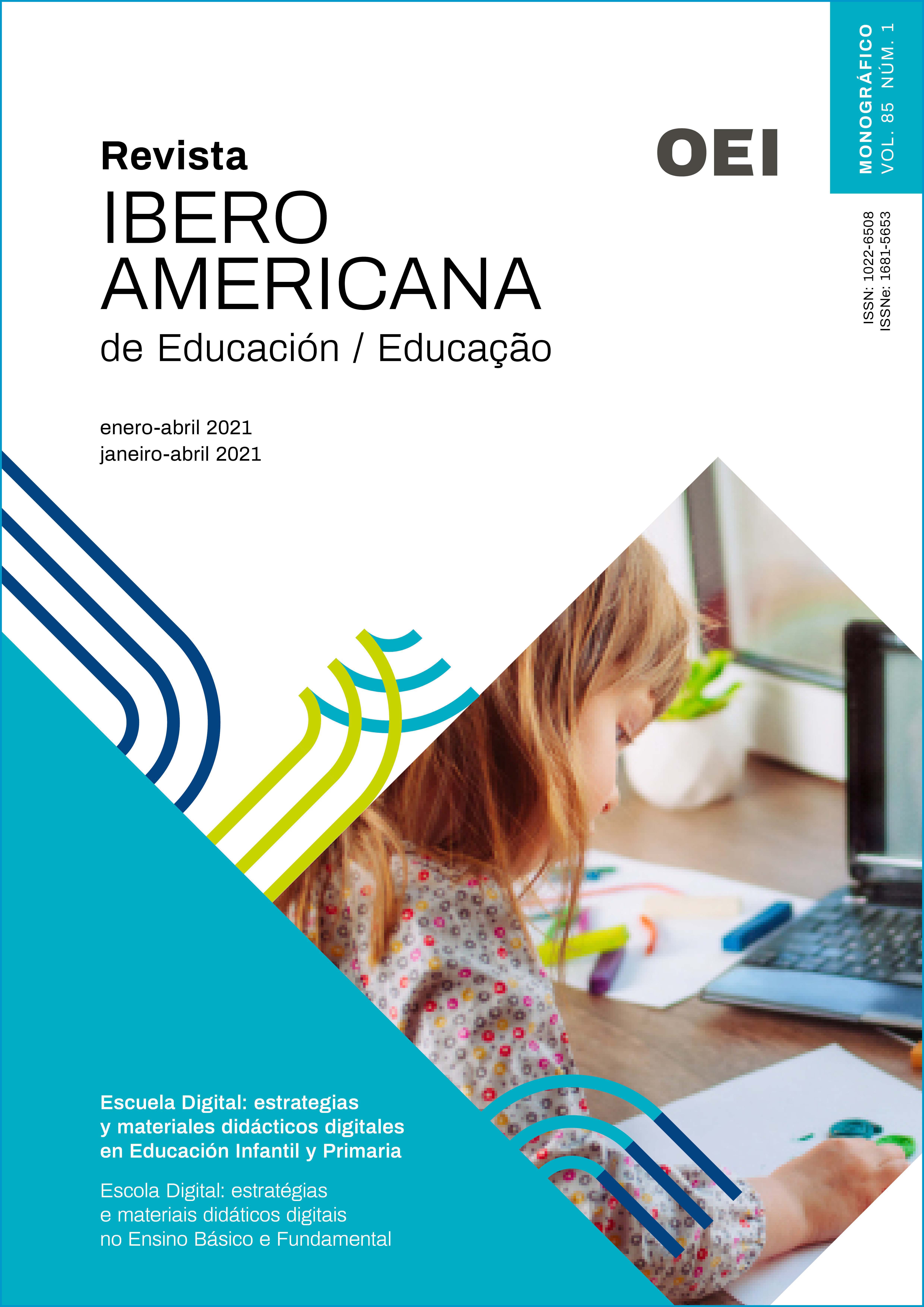Developing critical thinking in kindergarten with and through digital resources
DOI:
https://doi.org/10.35362/rie8513984Keywords:
didactic; learning; student; primary school; education technologyAbstract
The current pandemic and social isolation scenario challenges educators to reinvent pedagogical ways of acting that enhance the child's harmonious development, using the development of their critical thinking.
In this process, recognizing the pedagogical potential of digital technologies and resources and the need to create networked learning environments, involving children and their families, the kindergarten teacher and the surrounding society, this article aims to describe and reflect on the pedagogical implications inherent to the creation and dynamization of an experience lived with children of three and four years, in pre-school education, showing the critical thinking skills to be developed.
This study assumes investigative characteristics that reflect on the educator's pedagogical action, bearing in mind that it is intended to report the options taken to enhance the development of critical thinking skills through the use of diversified digital resources.
The study inserted in a qualitative paradigm demonstrated the relevance of reflective educational action based on an informed selection process and the construction of educational resources that enhance the development of the child's critical thinking, through the pedagogical exploration of resources available in the digital sphere.
Downloads
References
Amado, J. (2014). Manual de Investigação qualitativa em Educação. Coimbra: Imprensa da Universidade de Coimbra.
Amante, L. (2007). As TIC nas escola e no Jardim de Infância. SÍSIFO: Revista de Ciências da Educação, 3, 51-64.
Beyer, B.K. (1984). Improving thinking skills: Defining the problem. The Phi Delta Kappan, 65(7), 486-490.
Cordeiro, M. (2015). O livro da criança. Lisboa: A esfera dos livros.
Edwards, C., Gandini, L. & Forman, G. (Eds.). (2012). The Hundred Languages of Children: The Reggio Emilia Experience in Transformation (3rd ed.). Santa Barbara: Praeger.
Ennis, R. (1985). A logical basis for measuring critical thinking skills. Educational Leadership, 43(2), 44-48. Acessível em https://bit.ly/2OH98cz
Dias, M.O. (2009). O Vocabulário do Desenho da Investigação. Viseu: Psico & Soma.
DGE (Abril de 2019-2020). Modelo de planificação de atividades para a Educação Pré-Escolar. Ministério da Educação/Direção-Geral da Educação (DGE). Obtido de Apoio às Escolas.
Fortin, M.-F. (1999). O processo de Investigação: da concepção à realização. Loures: Lusociência, Edições Técnicas e Científicas.
Francisco, D.J. & Silva, A.P. (2015). Criança e apropriação tecnológica: um estudo de caso mediado pelo uso do computador e do tablet. Holos, 6(31), 277-296.
Guest, K. (2000). Introducing Critical Thinking to ‘Nonstandard’ Entry Students. The Use of a Catalyst to Spark Debate. Teaching in Higher Education, 5(3), 289-300.
Hohmann, M. & Weikart, D. P. (2009). Educar a criança. Lisboa: Fundação Calouste Gulbenkian.
Junior, J. & Coutinho, C. (2008). Rádio e Tv na Web: vantagens pedagógicas e dinâmicas na utilização em contexto educativo. TEIAS,17, 101-109. Acessível em https://bit.ly/3qtwSTg
Leopoldina, F., Ribeiro, I., Baptista, A., Costa, H., Cadime, I., Ríos, I., . . . Santos, S. (2014). Falar, Ler e Escrever: Propostas Integradoras para Jardim de Infância. Lisboa: Santillana.
Lino, D. (2013). O modelo pedagógico de reggio emilia. In Oliveira-Formosinho, J. (Org.), Modelos curriculares para a educação de infância: construindo uma praxis de participação. Porto: Porto Editora, pp. 109-140.
Lopes, J., Silva. H. & Morais. E. (2018). Teste de pensamento crítico para estudantes dos ensinos básico e secundário. Revista de estudos e investigación en psicologia e educación, 5(2), 82-91.
Marchão, A. d. (2016). Ativar a construção do pensamento crítico desde o jardim-de-infância. Revista Lusófona de Educação, 32, 47-58.
Martins, I. P. (2002). Educação em ciência e educação em ciências. Aveiro: Universidade de Aveiro.
Morais, M. d. (2004). O Educador e a Personalidade Criativa: Algumas considerações. Criatividade e Educação, 5, 33-45.
Oliveira-Formosinho, J. (2007). Pedagogia(s) da infância: reconstruindo uma praxis de participação. Em J. Oliveira-Formosinho e T. Kishimoto, Pedagogia(s) da infância. Dialogando com o passado. Construindo o futuro (pp. 13-36). São Paulo: Artmed.
Ponte, J. P. (2002a). Investigar a nossa própria prática. Em GTI (Org), Reflectir e investigar sobre a prática profissional. (pp. 5-28). Lisboa: APM.
Ponte, J. P. (2002b). As TIC no início da escolaridade - Perspectivas para a formação inicial de professores. Em J. Ponte (org.) A formação para a integração da TIC na Educação Pré-Escolar e no 1.º Ciclo do Ensino Básico (pp.19-26). Porto: Porto Editora
Silva, A., Lapa, C., Cruz, D. & Tavares, M. (2019-2020). Programas Educativos Serralves. Obtido de Serralves: https://bit.ly/3qEvtJR
Silva, I. L., Marques, L., Mata, L. & Mota, M. (2016). Orientações Curriculares para a Educação Pré-Escolar. Lisboa: Ministério da Educação/Direção-Geral da Educação (DGE).
Swartz, R. & Perkins, D. (1990). Teaching thinking: Issues & approaches. Pacific Grove, CA: Critical Thinking Press & Software.
Teixeira, S. d. (2014). Recursos digitais no Jardim de Infância: A narrativa digital para pormover multiliteracias. Braga: Universidade do Minho.
Swartz, R. & Perkins, D. (1990). Teaching thinking: Issues & approaches. Pacific Grove, CA: Critical Thinking Press & Software.
UNICEF (2019). Convenção sobre os Direitos da Criança e Protocolos Facultativos. Comité Português para a UNICEF. Acessível em https://bit.ly/36LajBR.
Verdasca, J., Neves, A. M., Fonseca, H., Fateixa, J. A., Procópio, M. & Magro-C, T. (2020). A Escola em Tempos de COVID19: reflexões sobre o novo “normal” e perspetivas para o futuro. Norte 2020 Educação para todos,13, 11-14.
Vieira, R. M., Tenreiro-Vieira, C. & Martins, I. (2011). A educação em ciências com orientação CTS. Porto: Areal Editores.
How to Cite
Published
Issue
Section
License
Any authors who publish with this journal accept the following terms:
















